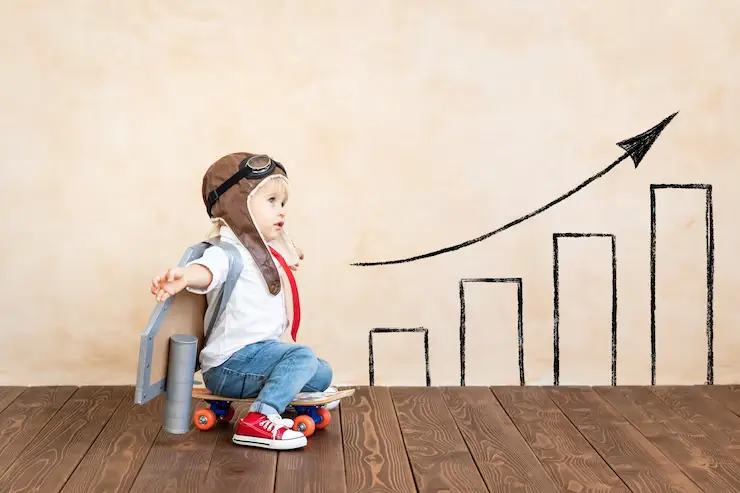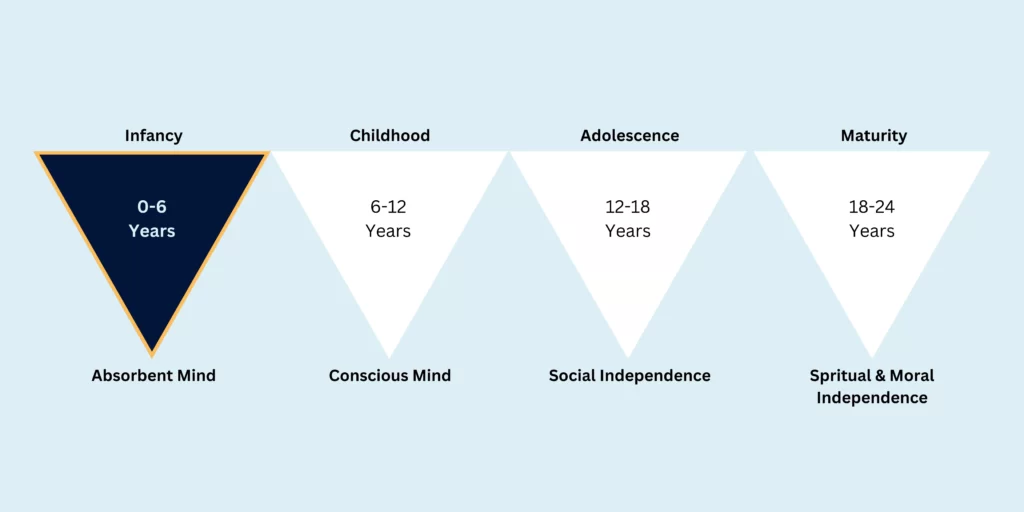



Welcome to our blog, a valuable resource created specifically for parents in search of insightful tips and ideas for good parenting. We understand that good parenting stems from a deep understanding of your children. To cultivate this understanding, it is crucial for every parent to grasp fundamental concepts surrounding the workings of a child’s mind, their learning processes, and the significant factors that shape their growth and development.
Embark on a fascinating journey through child development, a captivating adventure marked by distinct stages commonly referred to as planes. By delving into these planes, we unlock valuable insights into the unique needs and capabilities of children at different ages. In this blog post, we delve into the Montessori approach, providing a comprehensive exploration of the four planes of child development. Join us as we highlight the key characteristics and significant milestones within each stage, equipping you with the knowledge and tools necessary to navigate the wonderful world of parenting with confidence and expertise.
Montessori education is a well-founded educational approach created by Maria Montessori, an Italian physician and educator. It places great importance on fostering independence, allowing children to have freedom within certain boundaries, and respecting their natural psychological, physical, and social growth. The fundamental belief of Montessori education is that every child is a distinct individual with great potential and a desire to learn and engage.

The first plane of development, spanning from birth to six years, is a period of remarkable growth and learning. During this stage, children possess an extraordinary capacity to absorb information, earning them the title of “The Absorbent Mind” coined by Maria Montessori. They exhibit sensitive periods of learning, during which they are particularly receptive to acquiring specific skills.
In the initial three years of this plane, children acquire knowledge unconsciously, driven by their exploration of the senses and interactions with the environment. As they enter the latter half of the first plane, typically around three to six years old, their learning becomes more conscious. They engage in hands-on activities, utilizing specialized Montessori materials designed to enhance their development.
Orderliness and a sense of method are notable characteristics of children in the first plane. They demonstrate a preference for structure and appreciate the step-by-step nature of practical life lessons in the Montessori classroom. The intentional organization of materials on the shelves aligns with their inherent sense of order.
This phase is marked by a declaration of independence as children exclaim, “I can do it myself.” Physical independence becomes a significant focus during the first plane, shaping their development.
The second plane of development, spanning from six to twelve years, is a time of expanding horizons for children. They start to shift their attention beyond themselves, developing a strong desire to form peer groups. Unlike the previous plane, where children were content working independently near others, they now feel compelled to collaborate actively with their friends. Collaboration becomes a pivotal aspect of their learning experience.
Significant physical growth occurs during this stage, often resulting in a temporary lack of body awareness. Children may appear clumsy, frequently bumping into objects or accidentally knocking things over. Additionally, the loss of baby teeth is a common occurrence. The sense of order and neatness observed in the first plane tends to diminish during the second plane.
Imagination takes center stage in the second plane. Montessori education, firmly rooted in reality, leverages storytelling and other engaging methods to impart knowledge to children. For instance, when introducing the origins of the universe, Montessori schools employ the Great Lesson, a dramatic narrative conveyed through props, experiments, and theatrics. This captivating approach imparts essential concepts related to the solar system, states of matter, and more.
Children in the second plane display a voracious appetite for information, gravitating towards cultural subjects like science, history, and geography. While supporting their rapid linguistic and mathematical growth, it is crucial to provide them with a diverse range of enriching cultural lessons and experiences.
Moreover, this period witnesses the development of a sense of moral justice in children. They become deeply concerned with fairness, often prioritizing the creation of rules for a new game as much as playing the game itself. Intellectual independence becomes a significant aspiration during the second plane.
The third plane of development corresponds to the adolescent years, encompassing the age range of 12 to 18. In this stage, children transition from being aware of social connections to actively critiquing them. They heavily rely on peer relationships and seek independence from adults, although not yet ready to fully detach. It is our responsibility to provide a safe structure that allows them to experiment with independence.
Sleep patterns undergo changes during this plane, with adolescents requiring more sleep and tending to wake up
The final plane is a time in which young adults are striving for financial independence. They are often living away from home for the first time, and use this time to figure out where they fit into their society. Many make choices to further their education and/or explore career paths.
It is during the fourth plane that people begin to develop a truer sense of who they are as individuals.
Each plane of development should be mindfully nurtured. If a child is able to experience one developmental phase in a rich and carefully prepared environment, they are ready to fully take on the next phase when it is time.
Conclusion:
The Montessori philosophy emphasizes creating a nurturing environment aligned with children’s developmental needs. Understanding and addressing the characteristics of each stage of development optimize growth and learning. From the absorbent mind to the quest for independence, every plane shapes individuals into confident adults. Embracing the Montessori approach ensures a seamless transition between planes, enabling children to flourish. At Global Kids Preschool, we follow the Montessori curriculum, incorporating these concepts into our activities. To learn more about our curriculum and methodologies, click here.
Reference: https://hollismontessori.org/blog/2018/4/2/montessori-basics-the-planes-of-development.
No Related Post